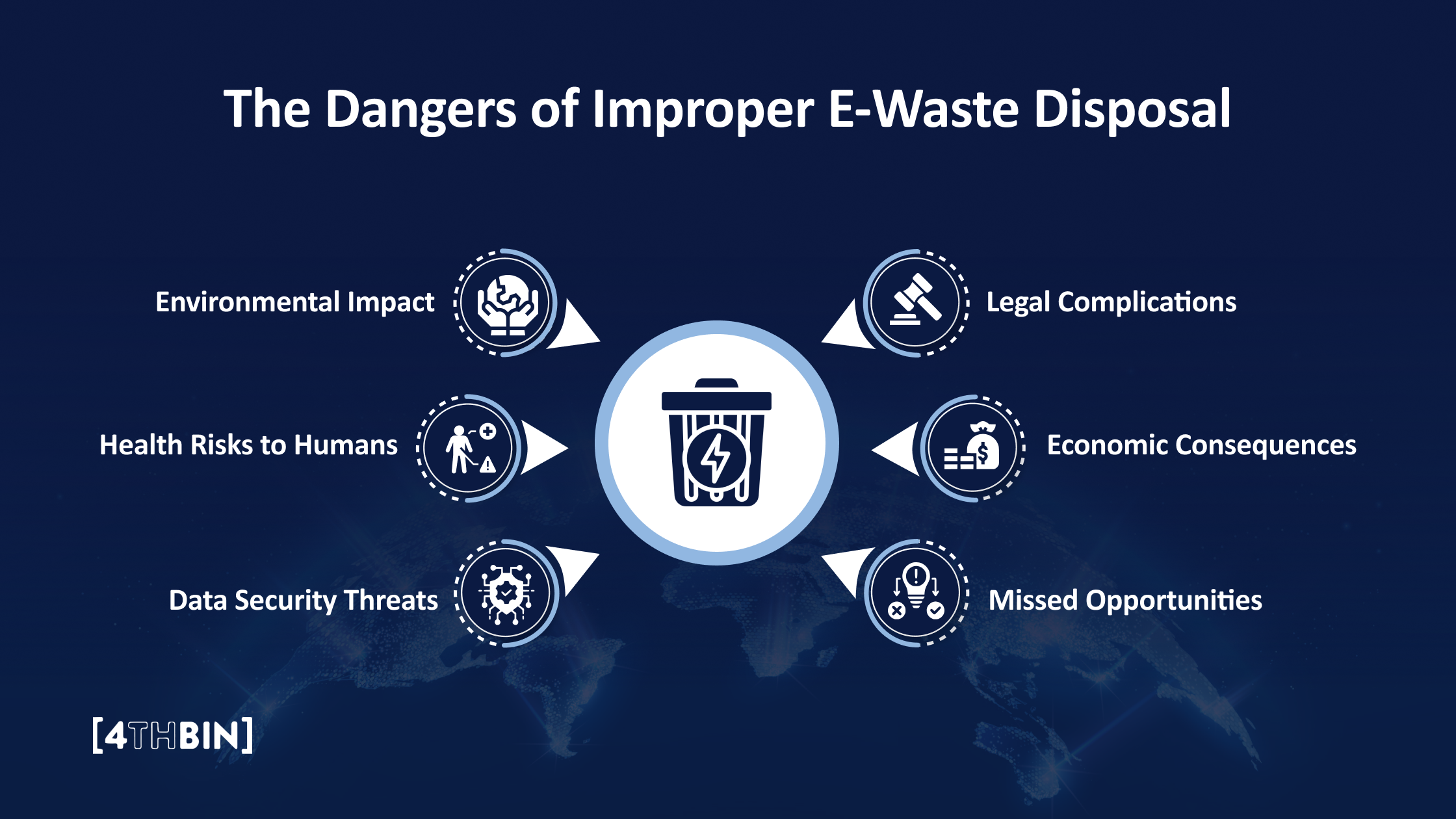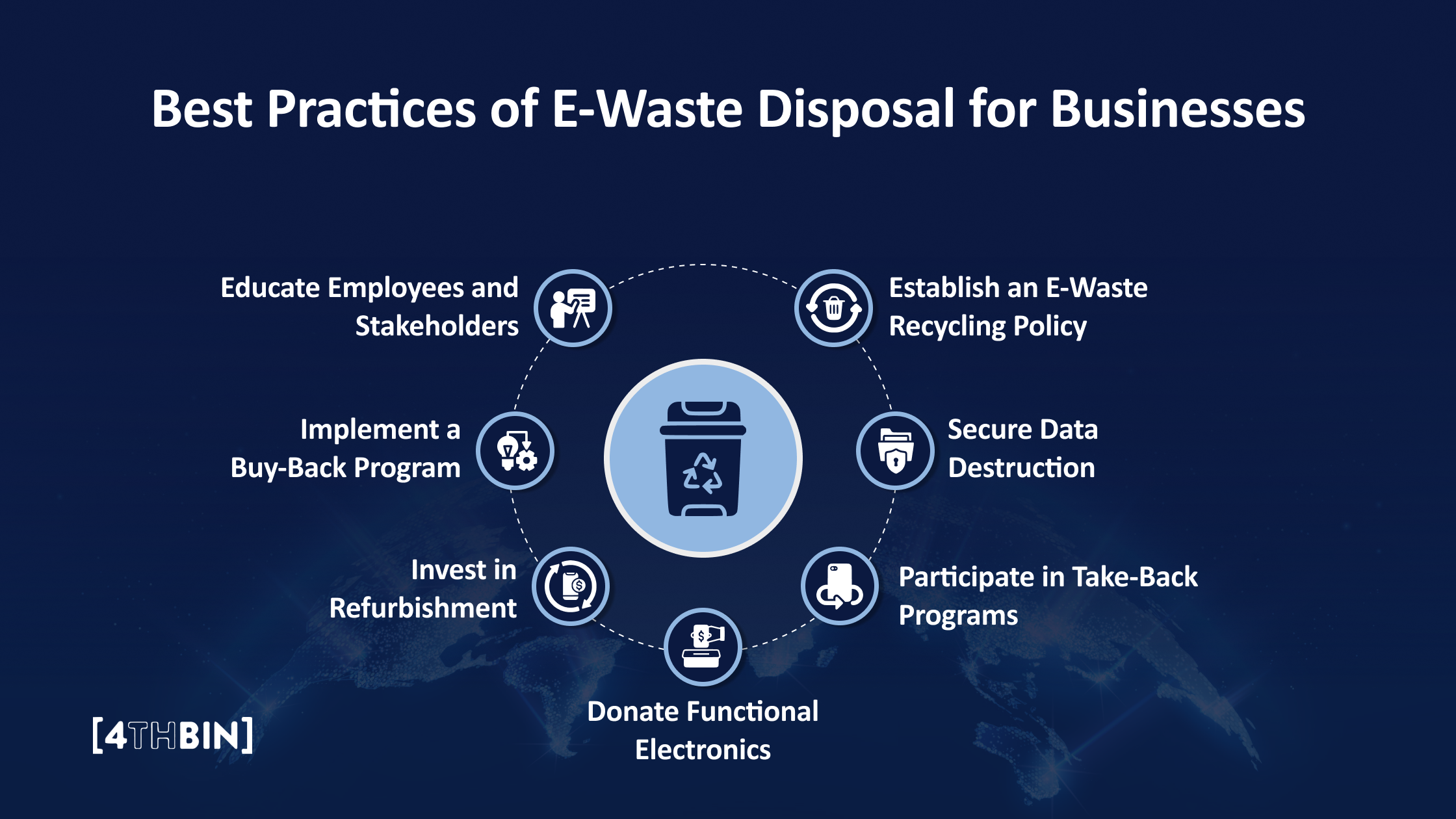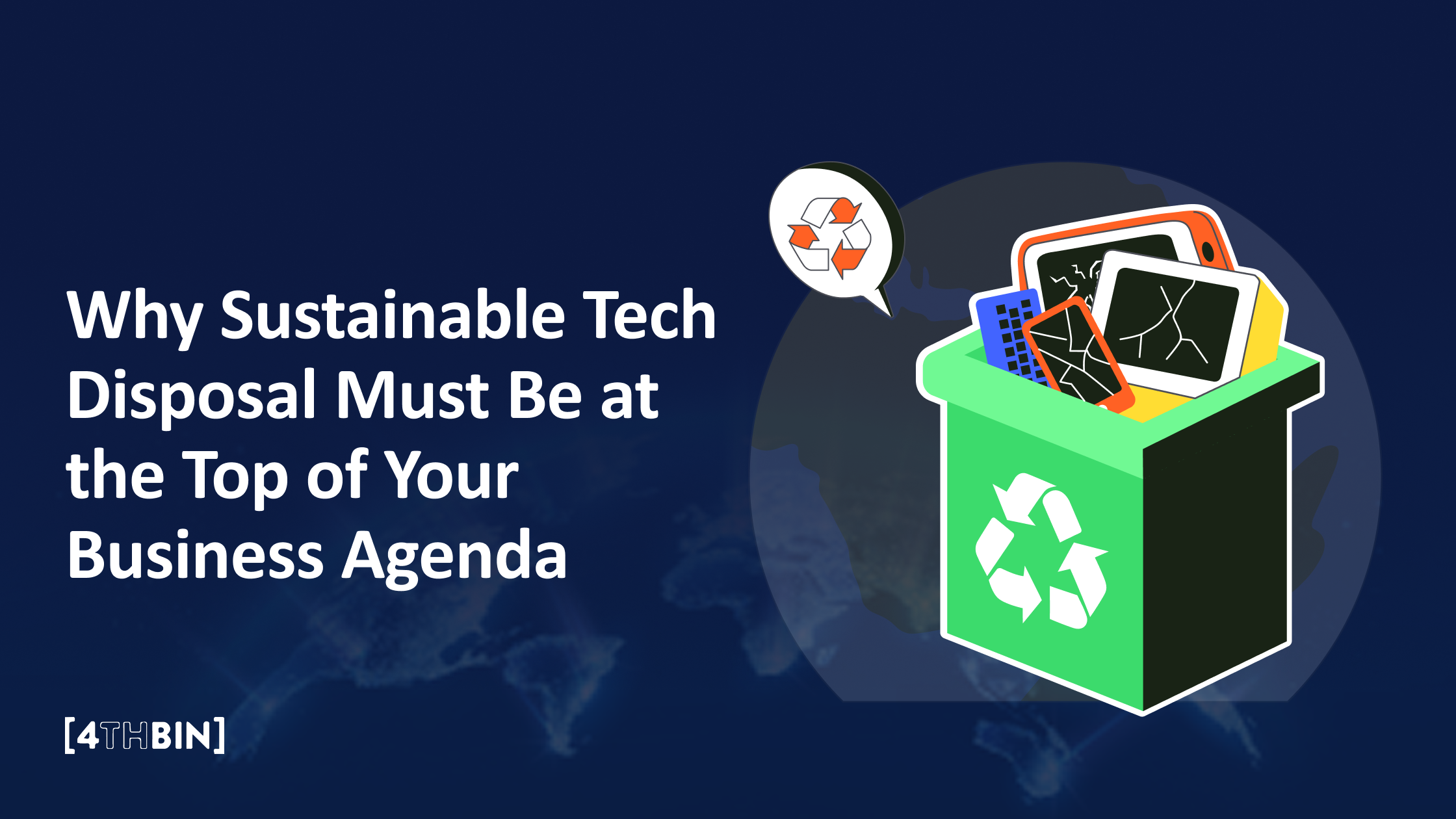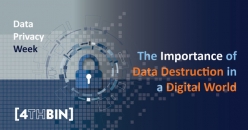The Hidden Dangers of Improper E-Waste Disposal
Every year, businesses generate vast amounts of electronic waste—obsolete computers, phones, servers, and more—all of which contain toxic materials and sensitive data. While many companies focus on upgrading their technology, the real risk often lies in how they manage their discarded devices.
A single discarded smartphone or laptop could leak dangerous chemicals into the soil and water, contributing to pollution and climate change. Worse still, your company’s sensitive data could be recovered from improperly disposed devices, leading to costly data breaches and reputational damage.
These risks are not just hypothetical; they already impact businesses worldwide.
The good news? There’s a solution.
Businesses can protect themselves and the planet by understanding the hidden dangers of improper e-waste disposal and adopting responsible practices.
This blog will discuss the environmental, health, legal, and economic risks of mishandling e-waste and, most importantly, what your business can do to turn these risks into opportunities for sustainability and security.
The Dangers of Improper E-Waste Disposal

Businesses must be aware of the dangers posed by improper e-waste disposal. The impact goes beyond environmental harm—improper electronics handling introduces severe risks to public health and data security. Here are a few hidden dangers of improper e-waste disposal for businesses:
Environmental Impact
Improper e-waste disposal has far-reaching environmental consequences, primarily due to pollution and climate change. It is responsible for approximately 70% of reported hazardous toxicants in the environment.
When electronics are discarded improperly, they often end up in landfills or are incinerated, releasing harmful toxins into the environment. Computers, smartphones, and televisions contain chemicals like lead, mercury, and cadmium. As these materials break down, they leach into the soil and water, contaminating ecosystems and threatening plant and animal life.
Furthermore, incinerating e-waste releases greenhouse gasses and toxic fumes, which degrade air quality and contribute to global warming. It’s estimated that 852 metric tons of CO2 compounds will be emitted from e-waste by 2030. The growing demand for electronic devices means more raw materials are extracted to meet production needs. This continuous cycle of extraction, production, and disposal significantly increases the electronics industry’s carbon footprint.
Health Risks to Humans
The health risks associated with improper e-waste disposal are severe, particularly for people in areas where e-waste is dismantled or processed without adequate safety measures. The toxins released during improper handling of e-waste, such as heavy metals and flame retardants, are hazardous to human health. Prolonged exposure to these chemicals can cause respiratory issues, skin irritations, neurological damage, and even cancer.
Children and workers in informal recycling sectors in developing countries are particularly vulnerable. Without protective gear, they risk exposure to over 1,000 harmful substances. Moreover, the chemicals from improperly discarded e-waste can enter water sources and contaminate drinking water and food supplies, leading to widespread health problems in surrounding communities.
Data Security Threats
Improper e-waste disposal poses environmental and health risks and significantly threatens data security. Many electronic devices store sensitive information long after they’ve been used. Whether personal data on smartphones or confidential business information on computers, hackers or criminals can exploit improperly discarded electronics.
Even if a device no longer works, its data can often be retrieved. Personal identities, financial information, and corporate secrets are at risk without secure data destruction. Identity theft and data breaches are significant consequences of improperly wiping or destroying data before disposal.
A report from early 2023 revealed that several Australian government agencies and major corporations were improperly disposing of IT equipment without wiping sensitive data. These devices, containing personal, medical, and even critical infrastructure information, were sold secondhand, both locally and internationally.
Some devices even had spreadsheets containing customer credit card information, posing severe cybersecurity threats. Certified e-waste recycling companies, such as 4THBIN, provide solutions, including secure data destruction, ensuring that sensitive information does not fall into the wrong hands.
Legal Complications
Improper e-waste disposal can lead to serious legal issues. Many countries and states have enacted strict e-waste regulations governing the disposal and recycling of electronic waste. In some regions, businesses that fail to follow proper e-waste management protocols face significant fines and penalties.
In the U.S., the Environmental Protection Agency (EPA) and Resource Conservation and Recovery Act (RCRA) enforce laws to reduce the environmental impact of e-waste and ensure safe disposal practices. Non-adherence to these laws and regulations can result in fines of up to $37,500 per day per violation.
Improper e-waste disposal can also lead to reputational damage for businesses. Companies found violating environmental or data security regulations may face legal battles, loss of trust, and public backlash. Complying with local e-waste laws is not just about avoiding legal trouble—it’s also a matter of corporate responsibility.
Economic Consequences
Improper e-waste disposal isn’t just harmful—it’s also economically wasteful. Recycling one million laptops saves the energy equivalent to the electricity used by more than 3,500 U.S. homes in a year.
Electronic devices also contain valuable materials, including gold, silver, copper, and rare earth metals. Recycling one million cell phones recovers over 35,000 pounds of copper, 772 pounds of silver, 75 pounds of gold, and 33 pounds of palladium. These valuable resources are lost forever when e-waste is discarded rather than recycled. This drives up the cost of producing new electronics and increases the need for mining and raw material extraction, further depleting natural resources.
On a larger scale, failing to recycle e-waste represents a missed opportunity to create jobs in the recycling industry. Proper e-waste recycling facilities generate employment while reducing environmental harm. In the United States alone, the e-waste recycling industry supported 681,000 jobs and generated $37.8 billion in wages in 2012.
Every 1,000 tons of materials recycled creates an average of 1.17 jobs, highlighting the potential for job creation through better recycling efforts. The economic benefits of recycling e-waste far outweigh the costs of improper disposal, making it both a financially and environmentally wise choice.
Missed Opportunities
Beyond the environmental and economic costs, improper e-waste disposal represents a significant missed opportunity to contribute to a circular economy. It’s estimated that unrecycled e-waste contains $57 billion worth of precious materials such as gold, silver, copper, and rare earth elements, but only $10 billion is recovered in environmentally sound ways.
When electronic devices are properly recycled, their components can be reused in manufacturing new products, reducing the demand for new materials and minimizing the industry’s environmental impact.
For example, recycling e-waste in Minnesota could recover 78 million pounds of valuable materials, which is enough copper for 155,000 electric vehicles and enough silver for 440,000 solar panels. Additionally, many electronics can be refurbished and reused, extending their lifespan and reducing overall waste.
Moreover, responsible e-waste disposal promotes sustainability and supports materials recovery and innovation in recycling technologies. By adopting better practices, individuals and businesses can help create a more sustainable electronics industry, reducing waste, saving resources, and minimizing environmental harm.
Best Practices of E-Waste Disposal for Businesses

Businesses can adopt several best practices that reduce waste and contribute to environmental sustainability and cost efficiency. Here are
Establish an E-Waste Recycling Policy
Implementing a company-wide e-waste recycling policy is essential. Businesses should ensure that old electronics, such as computers, servers, and mobile devices, are responsibly disposed of through certified e-waste recyclers.
The policy should cover everything from collection and storage to transportation and destroying sensitive data on old devices. Businesses must partner with recyclers certified by e-Stewards or R2 (Responsible Recycling) standards to guarantee environmentally responsible electronic waste processing.
Read More: Top 10 Benefits of Electronics Recycling for Businesses
Secure Data Destruction
Before businesses dispose of electronic devices, ensuring that sensitive data is securely wiped or destroyed is critical to avoid data breaches. Data stored on hard drives, smartphones, and other digital devices can be accessed even after they are discarded, posing severe risks to corporate security, privacy, and regulatory compliance.
- Data Wiping Software
Use specialized software to overwrite all data on a device multiple times, making it unrecoverable. Many businesses opt for software solutions that offer automated processes to wipe data thoroughly from devices, ensuring that sensitive information is entirely erased.
- Physical Destruction
Physical destruction is an alternative for highly sensitive data or devices that cannot be effectively wiped out. Hard drives, flash drives, and other data-storing components can be shredded, pulverized, or incinerated to ensure no one can access the information they once contained.
- Partnering with Certified Data Destruction Services
Collaborating with certified vendors, like 4THBIN, that offer on-site or off-site data destruction services guarantees an added layer of security. These vendors provide certificates of destruction, confirming that data was permanently destroyed and devices were disposed of in an environmentally responsible manner.
Participate in Take-Back Programs
Many electronics manufacturers and retailers offer take-back programs for businesses. These programs accept old or non-functional devices for recycling or refurbishment. Participating in take-back initiatives ensures that devices are processed through approved recycling channels. These programs not only reduce waste but may also offer incentives like discounts on new equipment.
Donate Functional Electronics
Businesses can donate working electronic equipment to non-profits, schools, or other organizations. Refurbishing and donating devices extends their life cycle and helps close the digital divide, particularly for underfunded institutions that need technology. Companies offer secure donation services for businesses looking to contribute to social causes while managing e-waste responsibly.
Invest in Refurbishment
For non-critical upgrades, businesses can refurbish old electronics instead of purchasing new ones. This involves upgrading existing systems to meet performance needs, extending the life of devices and reducing the environmental footprint of manufacturing new equipment. Refurbished devices require fewer raw materials, conserve energy, and often deliver the same functionality at a lower cost.
Implement a Buy-Back Program
Businesses can partner with manufacturers that offer buy-back programs for used electronics. This ensures that obsolete equipment is returned to manufacturers for proper recycling or reuse, creating a circular system where materials are continually repurposed. Buy-back programs also allow companies to recover some of the investment in old electronics.
Educate Employees and Stakeholders
Raising employee awareness about proper e-waste disposal practices is crucial for success. Businesses should conduct regular training sessions and provide resources on securely handling and disposing of electronic equipment. Setting up dedicated e-waste bins in the office and ensuring easy access to certified recyclers will increase participation in sustainable practices.
Recognizing the importance of proper e-waste recycling and disposal is essential for safeguarding the environment and business operations. By implementing strict e-waste management protocols, partnering with certified recyclers, and ensuring secure data destruction, businesses can reduce risks while contributing to a more sustainable and safe future.
Turn E-Waste Risks into Opportunities with 4THBIN.

Improper e-waste disposal can expose your business to serious risks—environmental hazards, data breaches, and regulatory fines.
At 4THBIN, we offer trusted, certified e-recycling solutions that ensure your electronics are safely and responsibly handled.
With over a decade of experience, we serve over 10,000 businesses – from Fortune 100 companies to start-ups across the United States.
We believe that no data should be left behind! Backed by our data security expertise, we provide certified data destruction support to today’s top industries, safeguarding your company from the risks of data recovery associated with improper disposal.
Through our secure RemoteReturn program, direct mail-in service, and on-site collection, we offer flexible and reliable e-waste solutions suited to your business needs. We also help businesses fulfill their corporate social responsibility commitments by securely recycling their e-waste and contributing to a greener future.
Don’t Let E-Waste Threats Stay Hidden.










